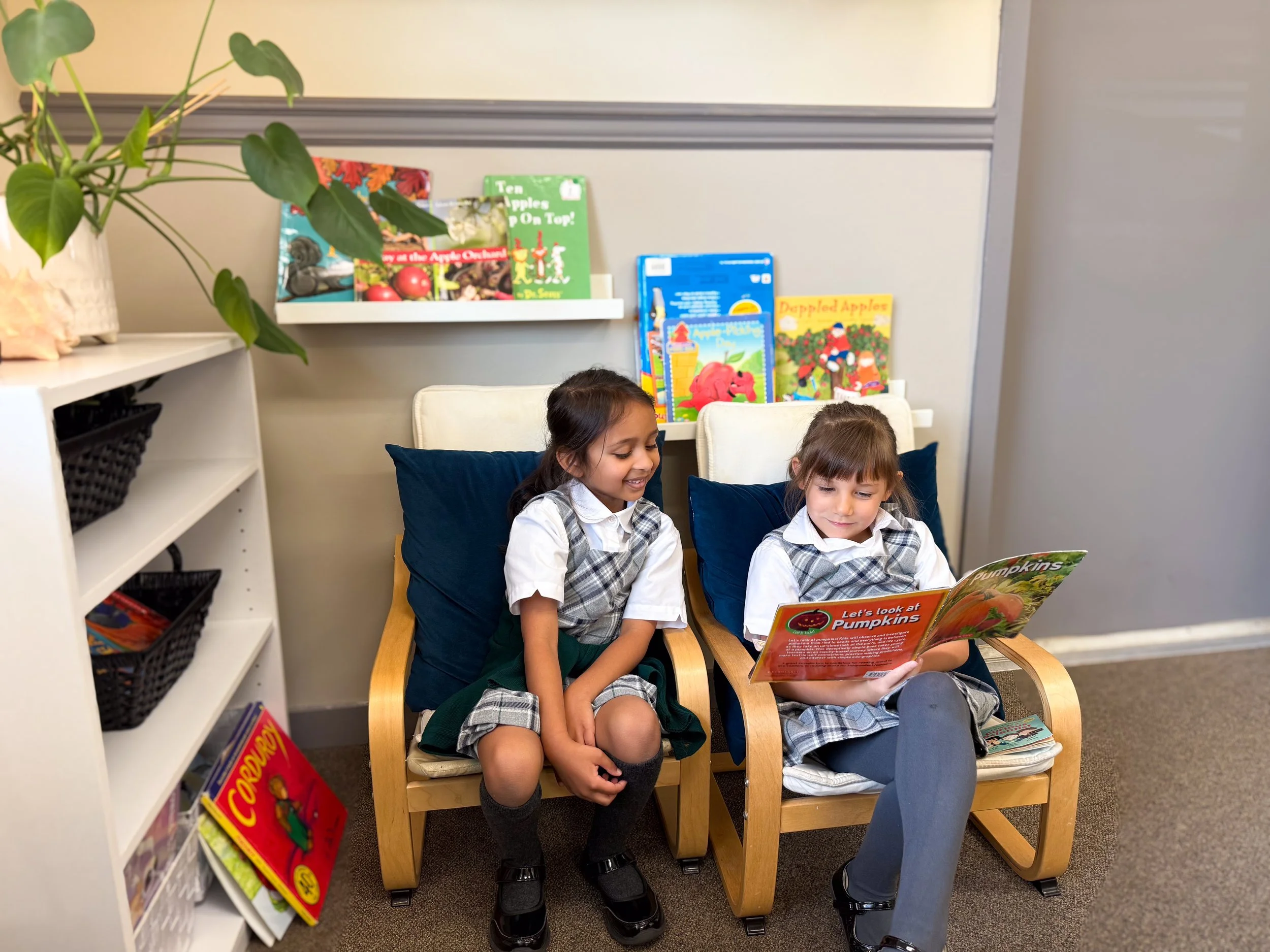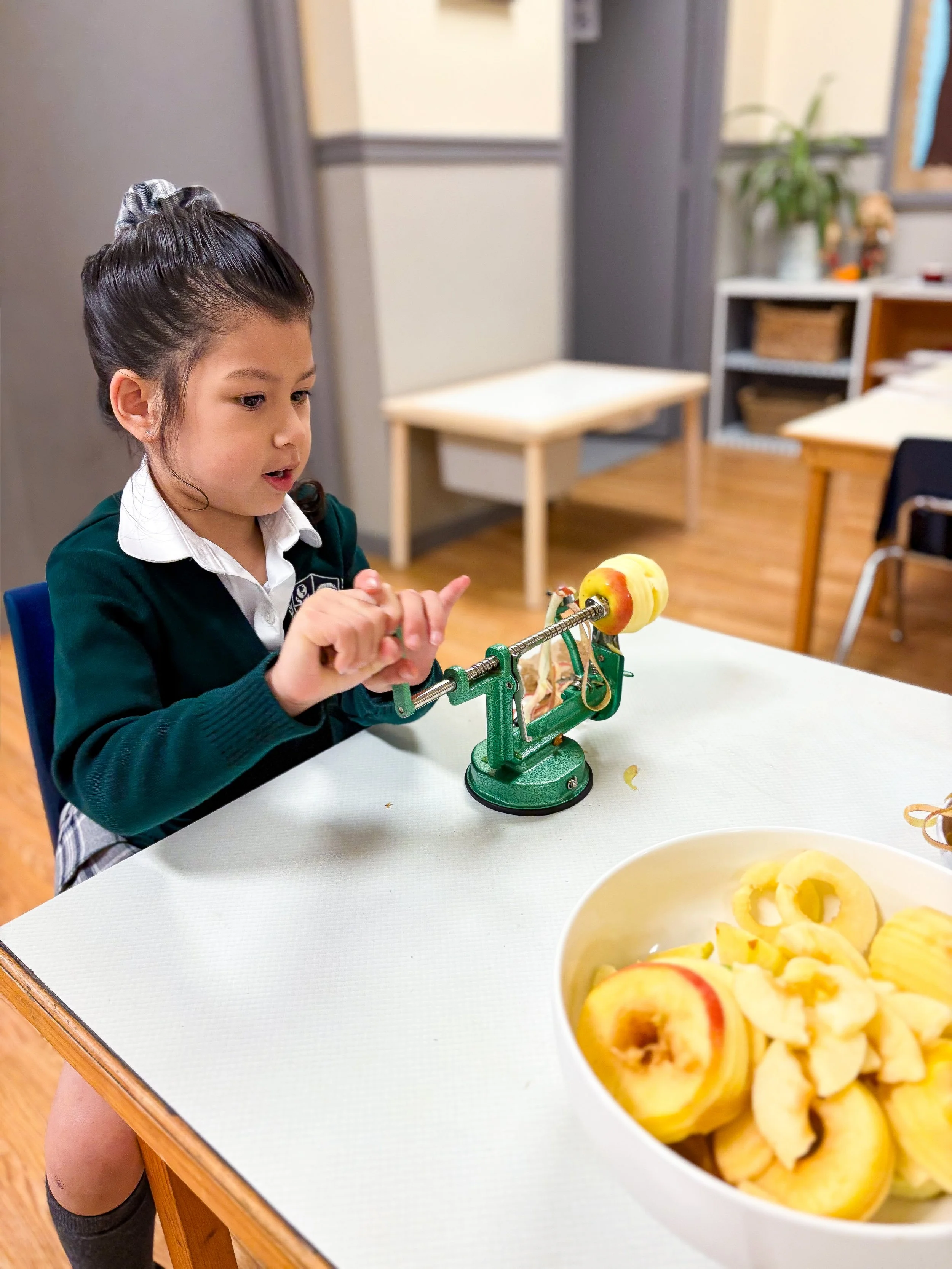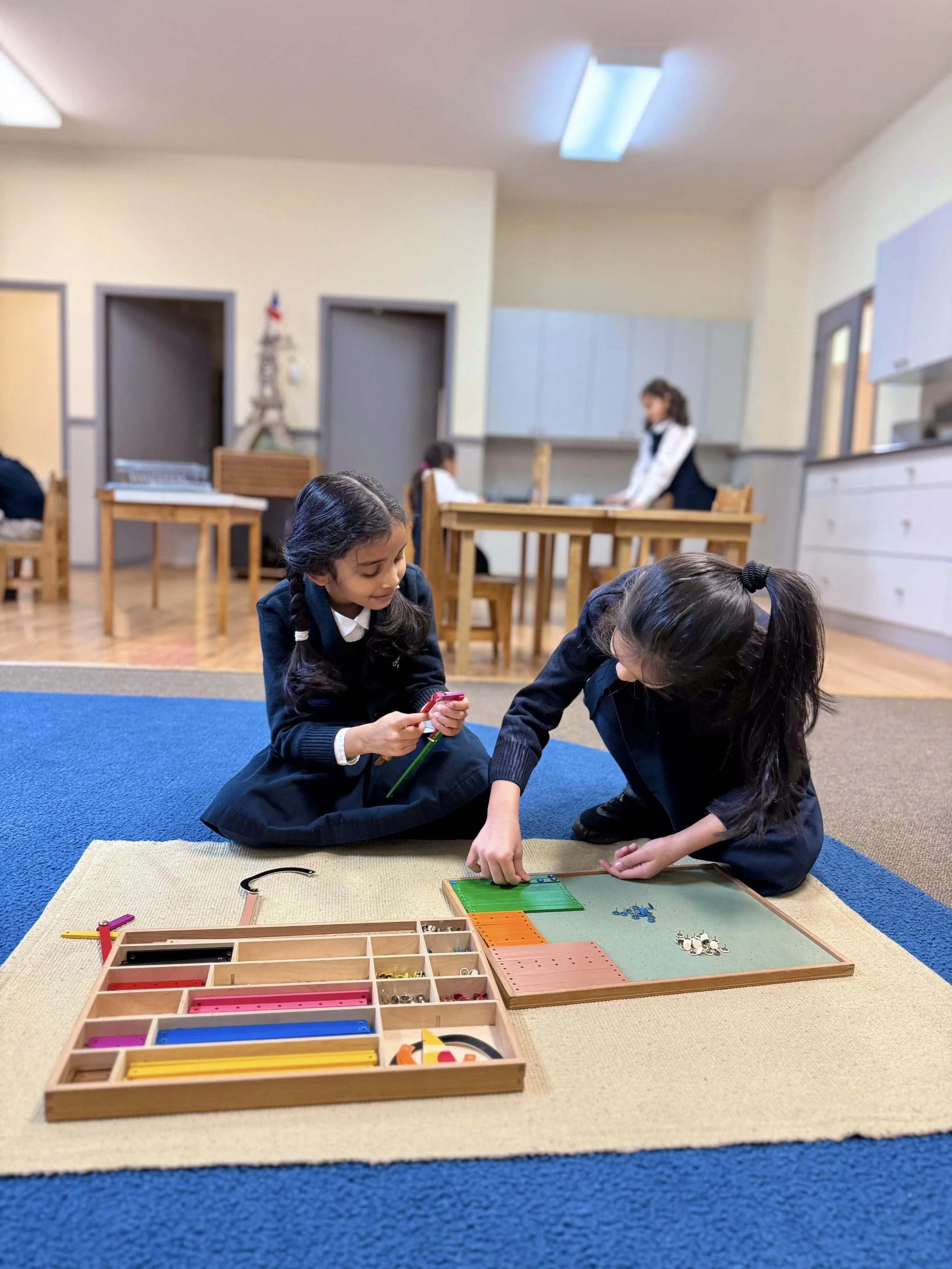
Kindergarten
Kindergarten is a very important year for a five year old. It is in this year that a child in a Montessori program thrives on being independent, and explodes into reading and writing.
Kindergarten is a transformative year in a child’s educational journey—where wonder, independence, and foundational academic skills come together in powerful ways. It is often during this year that children experience an ‘explosion’ into reading and writing, as their early literacy skills begin to flourish.
In mathematics, students are introduced to the decimal system and develop a strong, concrete understanding of units, tens, hundreds, and thousands using hands-on Montessori materials. Building on this foundation, they are then introduced to the four mathematical operations—addition, subtraction, multiplication, and division—through a carefully sequenced series of activities that guide them from concrete exploration to more abstract reasoning.
Beyond reading, writing, and math, Kindergarten at Cornerstone is a time of discovery across a broad and enriched curriculum. Geography, zoology, botany, music, and art and practical life all play a vital role in helping children make sense of the world. Students begin to explore not just their own immediate surroundings, but broader concepts of culture, nature, and global diversity. They engage in meaningful, integrated lessons that encourage creative expression and lay the groundwork for a lifelong love of learning.

Language
Cornerstone’s Kindergarten Language curriculum is based on the phonetic approach to learning to read. With a variety of fun lessons using hands on Language materials, the first step is for each child to learn the phonetic sound of each letter. Once a child knows about 60% of the phonetic sounds, they begin putting sounds together to form three letter phonetic words.
In addition to the Montessori learning materials, Cornerstone had a computer scientist develop a reading app, “Maria,” which follows the Montessori curriculum from the first step of phonetic sound recognition, right through to reading. It was a brilliant invention, and a great learning tool for all Cornerstone students!
The Kindergarten language program introduces children to a variety of language activities in order to assist students in establishing a permanent interest in literacy. Reading is an integrated process – it includes language experience, interrelated skills, whole language activities, phonetic instruction, as well as, a curious mind and an active imagination.
Mathematics
Montessori mathematical activities allow children to explore and internalize math concepts through hands-on, concrete experiences during the years when they are naturally drawn to tactile learning. Using beautifully designed materials, children don’t just see the symbols for 1, 1000, or ½—they can hold these quantities in their hands, making abstract concepts tangible and meaningful.
Through manipulating beads, rods, and number tiles, children begin to grasp the structure of the decimal system and build a strong understanding of units, tens, hundreds, and thousands. They are introduced to the four operations—addition, subtraction, multiplication, and division—in a way that is intuitive and rewarding. By combining, exchanging, sharing, and comparing these materials, they begin to understand not just how math works, but why it works.
These engaging activities lay a solid foundation in mathematical thinking, preparing children for abstract reasoning, problem-solving, and more advanced concepts in the years ahead. Most importantly, they foster a sense of confidence and excitement about mathematics.
Practical Life
Practical Life exercises assist the child in developing social skills and personal independence. Children learn to take care of themselves and their environment. In addition, practical life activities help to develop a child’s fine motor movement, which involves the body, intellect and will.
Practical Life activities are uniquely purposeful and calming. They appear very simple and repetitive, but as a child simply waters a plant or pours coloured water, he/she is, in fact accomplishing much more:
Developing a high level of concentration
Developing a sense of order (putting materials back where they belong)
Taking pride in a job well done
Developing an increasing sense of independence through care for themselves and their environment
Developing respect for their community (their classmates and teachers)
Improving fine motor movement
Many of the Practical Life Activities are tasks that a child will see done daily in the home, thus easing the transition to school. The young child is able to perform the activities he/she has seen adults do, using child-sized tools, e.g. pouring liquid into a container, tying a bow, rolling a mat, planting a seed, wiping a spill and more! The pace is unhurried and a teacher is nearby to help if needed but not to interfere.
In Practical Life, children develop their powers of concentration and control by working at a task from beginning to end.
Sensorial
Sensorial materials are designed to refine and develop the child’s senses. Children learn to order and classify impressions by using their senses, i.e. touching, seeing, smelling, tasting, listening and exploring the physical properties of their environment. In addition, sensorial activities build cognitive skills.
The Sensorial Area of the classroom contains a variety of materials, each of which has been designed to isolate a ‘material abstraction’, e.g. the ‘colour tablets’ are designed so that colour is the sole focus of the child’s attention. Each piece of sensorial equipment is designed to provide the child with a sensory-motor activity that will stimulate the senses and allow the child to form new concepts through experiences and exercise.
Culture
Culture includes the topics of geography, history, biology, botany, zoology, art and music. All children have an inherent curiosity about our world and the plants and animals that inhabit it. Through experiments, lessons and experiences, children make discoveries about their world.
Children learn about people and cultures in other countries with an attitude of respect and admiration. Through familiarity, children come to feel connected to the global human family. Lessons and experiences with nature inspire a reverence for all life. The comprehensive art and music programs give children every opportunity to enjoy a variety of creative activities, as well as, gain knowledge of the great masters.
In addition, children also participate in:
Physical activities – regular physical education classes in the school’s gymnasium and supervised outdoor playtime in the school’s play centre.
Weekly music classes where students enjoy music, and movement, participate in the school’s musical performances and learn basic music.
Fine arts – A variety of art and craft activities are always available in the “Art” section of the classroom. As well, art and craft activities are regularly incorporated into the social studies and science curriculum.






